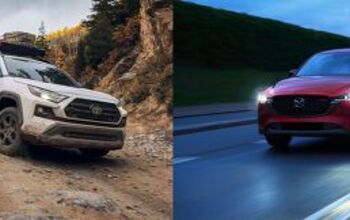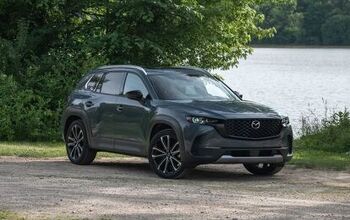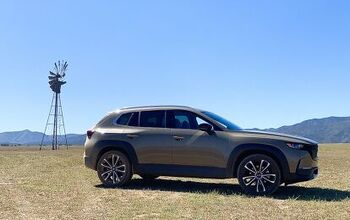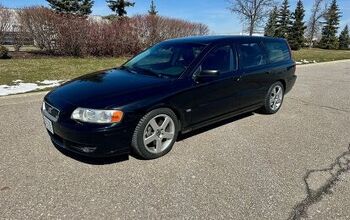The Right Spec: 2023 Mazda CX-50

Incomprehensible naming schemes aside (CX-50 versus CX-5 will be spoken of in marketing case studies for years to come), Mazda has made a habit of cranking out attractive-looking vehicles with an eye towards driving enjoyment. Helping the latter immensely is the smart decision to have serious gearheads at the helm of most Mazda projects.
Playing the (slightly) off-road foil to the urban CX-5, the new-last-year CX-50 adds a bit of black wheel trim and a few squared-off styling cues when compared to its city-dwelling cousin. The CX-50 is also longer and wider, though it’s tough to tell if they’re not parked side-by-each. Paradoxically, the more rugged CX-50 has more ground clearance but is not as tall as the CX-5.
Two engine choices are on tap, ones that will be familiar to anyone who has hit up the brand’s build-and-price tool in the last few years. Kicking things off is a naturally aspirated 2.5-liter four-banger making 187 horsepower and a like amount of torque. Appending a turbocharger to the mill jacks the horse count to 256 when fed premium oats, while torque jumps to 320 lb-ft. It’s the latter which really wakes up the car, especially when driven back-to-back. Every CX-50 is all-wheel drive.
Mazda applies a dizzying array of trims to the non-turbo CX-50, ranging from $27,550 base model S through $29k Select and $30k Preferred before landing at Premium and Premium Plus which rings in at $37,150. That last trim sounds like a soup cracker. Stepping into the Turbo is similar, save for the two Preferred trims which are substituted with a Meridian Edition.
There’s a lot to like in the base S, including comforts like push-button start and a tilt/telescope steering wheel. Seats are cloth and manually adjusted at this price, while the 8.8-inch infotainment screen is hardly bigger than some smartphones. It does have wireless Apple CarPlay, however.
Despite its starting price of nearly 10 grand over the natural-aspirated base CX-50, we do heartily recommend the Turbo if within budget. Current supply chain woes could very well push buyers towards the Premium Plus trim of the N/A car anyway thanks to availability issues of the other trims, and the PP price tag is identical to that of the most affordable Turbo. Cargo volume et al are all equal to the lesser-engined car but fuel economy does take a 1 mpg hit; we feel that’s a price worth paying for the extra grunt.
But if frugality on the monthly payment ranks high, pop for the naturally aspirated Select trim. At just $1,400 more than the base S, it adds a better infotainment package, USB ports in the rear, leather-wrapped touchpoints and fake-leather seat trim, dual-zone climate, and a center console armrest. Don’t sleep on the value of that last feature, by the way.
Still – get the Turbo if you can.
[Image: Mazda]
Become a TTAC insider. Get the latest news, features, TTAC takes, and everything else that gets to the truth about cars first by subscribing to our newsletter.

Matthew buys, sells, fixes, & races cars. As a human index of auto & auction knowledge, he is fond of making money and offering loud opinions.
More by Matthew Guy
Latest Car Reviews
Read moreLatest Product Reviews
Read moreRecent Comments
- Varezhka I have still yet to see a Malibu on the road that didn't have a rental sticker. So yeah, GM probably lost money on every one they sold but kept it to boost their CAFE numbers.I'm personally happy that I no longer have to dread being "upgraded" to a Maxima or a Malibu anymore. And thankfully Altima is also on its way out.
- Tassos Under incompetent, affirmative action hire Mary Barra, GM has been shooting itself in the foot on a daily basis.Whether the Malibu cancellation has been one of these shootings is NOT obvious at all.GM should be run as a PROFITABLE BUSINESS and NOT as an outfit that satisfies everybody and his mother in law's pet preferences.IF the Malibu was UNPROFITABLE, it SHOULD be canceled.More generally, if its SEGMENT is Unprofitable, and HALF the makers cancel their midsize sedans, not only will it lead to the SURVIVAL OF THE FITTEST ones, but the survivors will obviously be more profitable if the LOSERS were kept being produced and the SMALL PIE of midsize sedans would yield slim pickings for every participant.SO NO, I APPROVE of the demise of the unprofitable Malibu, and hope Nissan does the same to the Altima, Hyundai with the SOnata, Mazda with the Mazda 6, and as many others as it takes to make the REMAINING players, like the Excellent, sporty Accord and the Bulletproof Reliable, cheap to maintain CAMRY, more profitable and affordable.
- GregLocock Car companies can only really sell cars that people who are new car buyers will pay a profitable price for. As it turns out fewer and fewer new car buyers want sedans. Large sedans can be nice to drive, certainly, but the number of new car buyers (the only ones that matter in this discussion) are prepared to sacrifice steering and handling for more obvious things like passenger and cargo space, or even some attempt at off roading. We know US new car buyers don't really care about handling because they fell for FWD in large cars.
- Slavuta Why is everybody sweating? Like sedans? - go buy one. Better - 2. Let CRV/RAV rust on the dealer lot. I have 3 sedans on the driveway. My neighbor - 2. Neighbors on each of our other side - 8 SUVs.
- Theflyersfan With sedans, especially, I wonder how many of those sales are to rental fleets. With the exception of the Civic and Accord, there are still rows of sedans mixed in with the RAV4s at every airport rental lot. I doubt the breakdown in sales is publicly published, so who knows... GM isn't out of the sedan business - Cadillac exists and I can't believe I'm typing this but they are actually decent - and I think they are making a huge mistake, especially if there's an extended oil price hike (cough...Iran...cough) and people want smaller and hybrids. But if one is only tied to the quarterly shareholder reports and not trends and the big picture, bad decisions like this get made.


































Comments
Join the conversation
Lower and wider makes this look much more appealing to me than a CX-5, even though I have no interest in the outdoorsy marketing.
The right spec would have more sidewall than the vehicle in that picture.